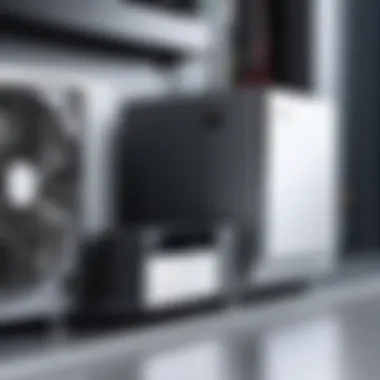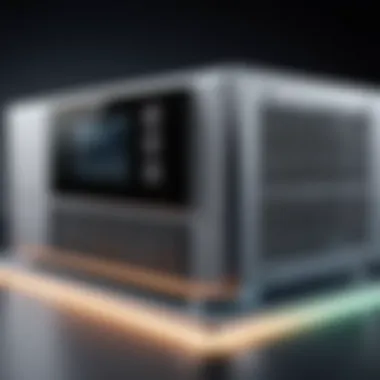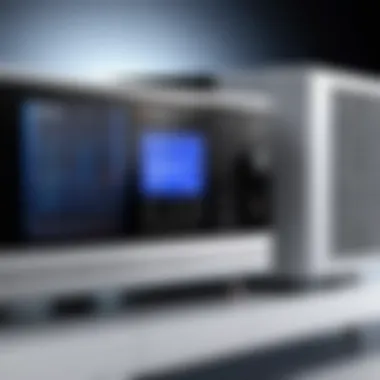Unveiling the Intricacies of Inverter AC Units: A Comprehensive Exploration


Overview of Inverter AC Units
In this section, we will embark on a journey through the intricate world of inverter AC units. We will unravel their inner workings, benefits, and the crucial considerations that consumers need to ponder upon. As the demand for energy-efficient cooling solutions continues to rise, understanding the nuances of inverter AC units becomes paramount for making well-informed decisions when it comes to air conditioning systems.
Fundamentals Unveiled
Let us delve into the foundational aspects surrounding inverter AC units. From dissecting the core principles and theories that underpin these units to outlining key terminologies and definitions, we will lay down a solid groundwork for comprehending the functioning of inverter AC technology. By grasping these basic concepts, readers can establish a strong foundational knowledge essential for navigating the complexities of this innovative cooling solution.
Practical Applications and Illustrations
Explore the practical realm of inverter AC units through real-world case studies and hands-on applications. By delving into demonstrations and projects that showcase the implementation of inverter technology, readers can gain a tangible understanding of how these units operate in everyday scenarios. Additionally, we will provide code snippets and practical guidelines to aid in the seamless integration of inverter AC systems, offering readers a practical avenue to apply their newfound knowledge.
Advanced Concepts and Emerging Trends
Dive into the forefront of inverter AC technology as we uncover the latest developments in the field. From exploring cutting-edge advancements to examining advanced techniques and methodologies, this section will shed light on the future prospects and upcoming trends in inverter AC technology. By staying abreast of these advancements, readers can stay ahead of the curve and anticipate the evolution of cooling solutions in the digital age.
Tips, Resources, and Further Learning
Expand your knowledge horizon with curated resources and practical insights for delving deeper into the realm of inverter AC units. Discover recommended books, courses, and online platforms that offer in-depth coverage of air conditioning technology. Additionally, explore the tools and software applications that enhance the practical usage of inverter AC systems, providing readers with a comprehensive toolkit to further their understanding and proficiency in this dynamic field.
Foreword to Inverter AC Units
In the realm of air conditioning, the advent of inverter AC units has sparked a significant shift towards energy efficiency and precise temperature control. This section serves as a gateway to unraveling the intricacies of these innovative systems. By delving into the nuances of inverter technology, we aim to provide a comprehensive understanding of their benefits and considerations, guiding consumers towards informed decisions when selecting air conditioning solutions.
Definition of Inverter AC Units
Overview of Inverter Technology
Inverter technology stands out as a fundamental aspect of modern AC units, revolutionizing the traditional cooling mechanism. The key characteristic of inverter technology lies in its ability to adjust compressor speed based on cooling demands, unlike conventional units that operate at fixed speeds. This dynamic feature ensures optimized energy usage and enhances overall cooling efficiency. The versatile nature of inverter technology makes it a popular choice for those seeking sustainable and cost-effective air conditioning solutions.
Distinction from Conventional AC Units
The distinction between inverter AC units and conventional counterparts lies in their operational efficiency. While traditional AC units switch the compressor on and off to regulate temperature, inverter AC units maintain a consistent speed, resulting in stable and precise cooling. This unique attribute aids in reducing energy consumption and ensuring a more balanced indoor climate. However, one must consider the initial investment required for inverter AC units, a factor that warrants attention when evaluating their advantages and disadvantages.


Operational Mechanism
Continuous Compressor Operation
At the core of inverter AC units is the concept of continuous compressor operation. Unlike traditional systems that operate in binary on/off mode, a continuous compressor ensures a steady flow of cooled air. This consistent performance not only enhances comfort levels but also prolongs the lifespan of the unit by minimizing strain on components. The seamless operation of a continuous compressor aligns with the overarching goal of inverter technology to deliver efficient and sustainable cooling solutions.
Variable Speed Compressor
A standout feature of inverter AC units is the integration of variable speed compressors. By adjusting compressor speed to match cooling requirements, these units offer unparalleled precision in temperature control. The ability to modulate compressor speed in real-time confers significant energy savings, as the system adapts to fluctuations in indoor thermal conditions. While the variable speed compressor excels in enhancing energy efficiency, its complex technology may require specialized maintenance, a factor to bear in mind for optimal unit performance.
Energy Efficiency
Power Consumption Comparison
Comparing power consumption between inverter and conventional AC units unveils the substantial energy-saving potential of the former. Inverter technology's capability to regulate compressor speed results in lower power consumption during operation, translating to reduced electricity bills for consumers. This emphasis on efficient energy utilization positions inverter AC units as environmentally conscious and economically viable alternatives in the realm of air conditioning.
SEER Ratings Importance
SEER (Seasonal Energy Efficiency Ratio) ratings play a pivotal role in assessing the efficiency of air conditioning systems. In the context of inverter AC units, higher SEER ratings signify superior energy performance, indicating better cooling output relative to energy input. The emphasis on SEER ratings underscores the significance of choosing units with optimal efficiency levels, as this directly impacts long-term operational costs and environmental sustainability. By prioritizing SEER ratings, consumers can make informed decisions that align with their energy-saving objectives, emphasizing the importance of efficiency benchmarks in evaluating air conditioning technology.
Advantages of Inverter AC Units
In the realm of air conditioning technology, inverter AC units stand out prominently for their advanced features and benefits. Understanding the advantages of inverter AC units is paramount in making informed decisions regarding air conditioning systems. These units revolutionize energy efficiency and temperature control in ways traditional systems cannot match, elevating the overall cooling experience to unprecedented levels of comfort and sustainability.
Enhanced Energy Efficiency
Smart Energy Usage
Within the domain of enhanced energy efficiency, smart energy usage plays a pivotal role. By intelligently adjusting compressor speed based on the cooling demands, inverter AC units optimize energy consumption without compromising performance. This dynamic functionality not only reduces electricity wastage but also contributes significantly to environmental preservation.
Reduced Electricity Bills
The reduction in electricity bills is a direct result of the superior energy efficiency offered by inverter AC units. By utilizing variable-speed technology, these units adapt to the cooling requirements, consuming only the necessary amount of power. Over time, the cost savings on electricity bills accumulate, making inverter AC units a wise and cost-effective investment choice.
Precise Temperature Control


Consistent Cooling Performance
Inverter AC units excel in providing consistent cooling performance due to their ability to adjust compressor speed according to the ambient conditions. This results in a uniform distribution of cool air across the space, eliminating hot spots and ensuring a comfortable environment throughout. The precise temperature control enhances overall user satisfaction and comfort levels.
Maintaining Optimal Comfort Levels
The feature of maintaining optimal comfort levels distinguishes inverter AC units from conventional systems. By continuously modulating compressor speed to match the cooling needs, these units offer a personalized cooling experience. The ability to maintain a constant temperature without abrupt fluctuations enhances comfort and promotes a healthier indoor environment.
Extended Lifespan
Reduced Wear and Tear
Inverter AC units mitigate wear and tear on components by avoiding constant starts and stops, typical of non-inverter models. The gradual acceleration and deceleration of the compressor reduce mechanical strain, extending the lifespan of the unit and enhancing its durability. This longevity translates to extended performance and reliable operation over the years.
Lower Maintenance Costs
The reduced wear on internal parts directly correlates to lower maintenance costs for inverter AC units. With fewer mechanical issues and smoother operation, maintenance requirements are minimized, translating into cost savings for homeowners. The decreased need for repairs and replacements adds value to the overall investment in an inverter AC unit.
Considerations when Choosing an Inverter AC Unit
In the realm of air conditioning technologies, selecting the ideal inverter AC unit is a decision that necessitates meticulous attention to detail. The significance of this topic lies in the pivotal role that choosing the right unit plays in optimizing energy efficiency and ensuring optimal cooling comfort within indoor spaces. When exploring considerations when choosing an inverter AC unit, several key elements come into play, ranging from capacity and size requirements to brand reputation and installation specifics. By delving into these factors, consumers can make well-informed choices that align with their specific needs and preferences.
Capacity and Size Requirements
Matching HVAC Needs
Matching HVAC needs to the appropriate inverter AC unit is an essential aspect of air conditioning optimization. By ensuring the capacity and size of the unit align accurately with the heating, ventilation, and air conditioning requirements of the space, users can maximize efficiency and performance. This alignment facilitates the unit's ability to function at its peak, delivering consistent cooling or heating without unnecessary strain. The uniqueness of matching HVAC needs lies in its tailored approach, customizing the air conditioning solution to suit the specific demands of the environment. This customization not only enhances comfort but also reduces energy wastage, making it a popular and beneficial choice for individuals seeking optimal air conditioning solutions.
Room Size Considerations
Room size considerations form another crucial factor when selecting an inverter AC unit. Understanding the dimensions and layout of the space to be conditioned is fundamental in determining the appropriate unit size. By taking room size into account, users can ensure effective air distribution and consistent temperature control throughout the area. The unique feature of room size considerations is their impact on energy efficiency and comfort levels. Tailoring the unit's size to fit the room dimensions prevents overworking the system and leads to efficient cooling or heating. While advantageous in promoting energy savings and comfort, improper sizing can result in inadequate performance and increased energy consumption, underscoring the importance of this factor in the air conditioning selection process.
Brand and Manufacturer Reputation
Reliability and Warranty


When evaluating inverter AC units, the reputation of the brand and manufacturer holds substantial weight. Opting for a unit from a reliable and reputable company ensures confidence in the product's quality and performance. The key characteristic of reliability and warranty lies in the assurance it provides regarding the unit's longevity and operational consistency. This instills trust in the consumer and reaffirms the unit's capability to deliver optimal cooling or heating throughout its lifespan. The unique feature of robust warranties and reliable brands is their ability to offer peace of mind and long-term value to customers, making them a popular and advantageous choice in the realm of air conditioning technology.
Customer Reviews
Customer reviews play a pivotal role in guiding consumers towards selecting the most suitable inverter AC unit. By considering feedback and experiences shared by other users, individuals can gain insights into the unit's performance, durability, and customer service quality. The key characteristic of customer reviews is their transparency and authenticity, offering firsthand accounts of real-world experiences with the product. This information aids prospective buyers in making informed decisions based on peer perspectives and recommendations. While advantageous in providing social proof and guidance, customer reviews also come with the potential for biased or subjective opinions, necessitating a discerning approach when factoring them into the purchasing decision.
Installation and Maintenance
Professional Installation
The process of installing an inverter AC unit requires precision and expertise to ensure optimal functionality and operational efficiency. Opting for professional installation services guarantees that the unit is set up correctly, adhering to manufacturer guidelines and safety standards. The key characteristic of professional installation lies in its meticulous approach, minimizing the risk of errors or malfunctions post-installation. This meticulousness not only enhances the unit's performance but also prolongs its lifespan, translating to long-term benefits for the user. The unique feature of professional installation is its attention to detail and technical proficiency, making it a beneficial and popular choice among consumers seeking a seamless air conditioning setup experience.
Regular Servicing Needs
Maintaining the upkeep of an inverter AC unit is essential in preserving its efficiency and longevity. Regular servicing addresses wear and tear issues, ensures all components are functioning optimally, and prevents potential breakdowns. The key characteristic of regular servicing needs is their preventive nature, preemptively detecting and resolving issues before they escalate. This proactive approach minimizes the risk of costly repairs and sustains the unit's performance over time. The unique feature of regular servicing is its role in promoting operational reliability and maximizing the unit's lifespan, making it a valuable and necessary consideration for individuals invested in the long-term functionality of their air conditioning system.
Finale
Summarizing the Benefits
Energy Efficiency
Delving into the realm of energy efficiency within the context of inverter AC units sheds light on a fundamental aspect of modern air conditioning systems. Noteworthy for its ability to optimize power consumption, enhance operational performance, and reduce environmental impact, energy efficiency stands as a hallmark feature of inverter technology. The adaptive nature of inverter AC units ensures that energy is utilized judiciously, resulting in substantial savings on electricity bills and a smaller carbon footprint. While the initial investment in an energy-efficient model may be slightly higher, the long-term advantages far outweigh the costs.
Temperature Control
Precision in temperature control emerges as a paramount factor shaping the appeal of inverter AC units. By maintaining consistent cooling performance and adjusting compressor speed in real-time to match cooling requirements, inverter technology ensures optimal comfort levels within indoor spaces. The capability to fine-tune temperatures according to specific preferences not only enhances user experience but also contributes to energy savings by avoiding unnecessary cooling cycles. The balanced interplay between energy efficiency and temperature control underscores the sophistication and efficacy of inverter AC units in meeting diverse cooling demands.
Longevity
Longevity, as an integral aspect of inverter AC units, underscores the durability and sustainability of these technologically advanced systems. By minimizing wear and tear on components through gradual compressor acceleration and deceleration, inverter technology prolongs the operational lifespan of air conditioning units. This reduced strain on mechanical parts translates to lower maintenance costs over time, making inverter AC units a prudent investment for homeowners seeking enduring performance and reliability amidst changing climatic conditions.
Final Thoughts
Future of Air Conditioning Technology
Gauging the trajectory of air conditioning technology propels us into a realm of innovation and adaptation driven by consumer needs and environmental considerations. The future holds promising developments in enhancing cooling efficiency, integrating smart controls for intuitive operation, and exploring sustainable refrigerants to mitigate environmental impact. As inverter technology continues to evolve and set new benchmarks for energy conservation and user convenience, the horizon of air conditioning unfolds with an array of possibilities for efficient and eco-friendly cooling solutions.
Importance of Inverter Technology
The intrinsic value of inverter technology reverberates across the air conditioning landscape, redefining standards for performance, efficiency, and sustainability. Its seamless integration with HVAC systems underscores the importance of adopting adaptable solutions that align with changing energy dynamics and varied cooling requirements. The versatility of inverter technology not only enhances user comfort but also underscores the industry's commitment to advancing technological frontiers in energy-efficient cooling. Embracing the importance of inverter technology heralds a paradigm shift in how we approach air conditioning solutions, setting a benchmark for future innovations in the pursuit of a greener and more efficient built environment.







